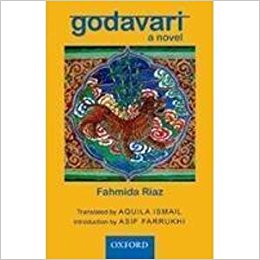Fahmida Riaz is a Pakistani feminist, a crusader for human rights and an iconoclast. Apart from being a well-known poet, short story writer and a novelist in Urdu, she has been closely associated with the women’s movement in Pakistan. Her defiant poetry collections include Patthar ki Zaban, Badan Dareeda, Dhoop, Kya Tum Poora Chand Na Dekh Paaoge, Hamrakab and Aadmi ki Zindagi. She has also written two novels, Godavari and Zinda Bahar Lane. She was given the Himmett-Hellman award by Human Rights Watch, New York, in 1997.
Fahmida’s Godavari is a gripping, fast-paced narrative that begins with the story of a family vacationing in a resort in Maharashtra. Deceptively simple, it articulates the complex relationship between people’s personal lives and their contemporary political context.
Even though it is a third-person narrative, it is told through Ma’s consciousness. Early in the novel, Ma, now a recognizable character in Fahmida’s works, is referred to almost dismissively. ‘A woman, like an essential body part, was also with this family.’ However, it is she who becomes the centre of the narrative. Ma, the mother in the family, begins by struggling to manage her husband’s interest in the Worli woman, Usha, who looks after the villa. Usha is contrasted with Ma, always having a ‘contented expression’ on her face, making it difficult for Ma to guess her thoughts. Usha is also portrayed as being in control, ‘the caretaker of the villa’ and economically independent. Fahmida implies a sisterhood even between these differently placed and different women. ‘The use of Bai asserted sisterhood.’ Ma, at the first opportunity, walks across confidently to Usha’s place to warn her about her husband’s interest in her. ‘Ma at once began to talk to Usha of the various things that somehow always crop up between women.’ However, Ma’s gaze is patriarchal in nature. ‘She was a beautiful woman, her limbs as soft and supple as the cucumber she had brought, and as savoury as the soft and tasty Marathi chappatis she had cooked.’ It is this acceptance of the patriarchal position that interferes with Ma’s search for personhood.


I like this web blog it’s a master piece! Glad I detected this ohttps://69v.topn google.Raise range